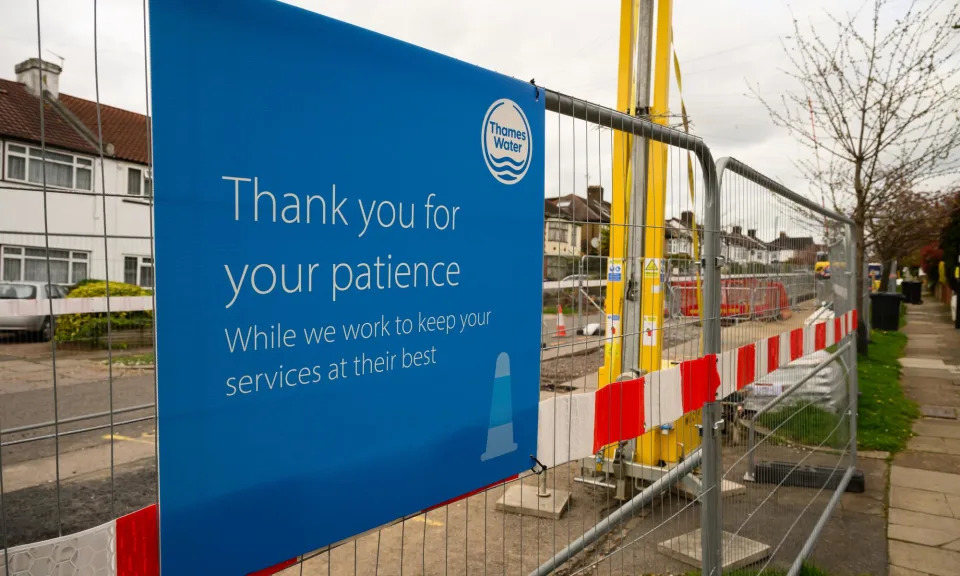WALES
Pioneering male midwife set for glowing retirement after nearly 20 yearsSallie Phillips
Wed, 17 April 2024

Mark Smart (centre) Newport's only male midwife is retiring after almost 20 years and was celebrated in a surprise party from colleagues last week (Image: Emma Bridge)
THE ONLY male midwife in Newport is set to retire after almost two decades in the industry.
Mark Smart began working at The Royal Gwent Hospital in 2005 after first becoming interested in midwifery seeing the home birth of his brother.
However, during the 1970s, it was not possible for men to become midwives, but thanks to some tireless campaigning from male nurses, in modern times, men are now allowed entry into the profession.

South Wales Argus: Newport's only male midwife Mark Smart is retiring after nearly 20 years
Newport's only male midwife Mark Smart is retiring after nearly 20 years (Image: Emma Bridge)Since 2005, he has delivered thousands of babies and worked with dozens of patients, with his most recent role bringing him to the induction side of midwifery patient care.
The Induction ward where Mr Smart has most recently worked alongside colleagues is where patients come to be induced for many different reasons, from being unwell to being post due date.
As a stalwart of the hospital, he has long encouraged those from all backgrounds, especially men, to apply to be a midwife with the right skills and qualifications.
When talking about what he loves most about the job, Mr Smart said: “Just to see new life coming into the world and you’ve just been a tiny little part of it and just to pick that baby up hand them to mum, it’s fabulous.”
Despite deciding now is the right time to retire, Mr Smart believes the excitement and nerves that come with being a midwife “never leave you”.
Mr Smart says the birth of his daughter was a “trigger” in encouraging him to go into nursing and later midwifery once the door had been opened for men.
Despite some initial raised eyebrows when he went into the profession, he says he has experienced little resistance and has found it to be a “very positive experience”.
Having waited 25 years from leaving school to beginning his midwifery training, Mr Smart has no doubt he made the right decision to follow his earliest career instincts.
Speaking to the Argus in 2012, he said: "When I was at school, I was fascinated by the idea of being a midwife, but I couldn't do it.
"I've always had a real passion for it, and that has stayed with me into this job. I know I made the right decision and I think I'm very lucky."
A beloved figure among the patients and staff at the Royal Gwent Hospital where he trained in 2000 and has worked ever since, Mr Smart “will be missed dearly” by his team and patients alike.

South Wales Argus: Colleagues at the Royal Gwent Hospital have said Mark will be missed dearly
Colleagues at the Royal Gwent Hospital have said Mark will be missed dearly (Image: Emma Bridge)Past patients have described him as “amazing”, “great and helpful” and “a wonderful human being”.
One patient even said they “couldn’t’ve asked for better care and support”.
Mr Smart was thrown a surprise retirement party on Friday, April 12, attended by many of his colleagues from the Royal Gwent.

South Wales Argus: Mark was thrown a surprise retirement party by his colleagues
Mark was thrown a surprise retirement party by his colleagues (Image: Emma Bridge)
In a heartfelt speech, he shared a final thank you with his “family”.
He said: “It’s been absolutely awesome. Thank you all for the last 20 years, its’s been completely brilliant.
“I can’t put it into words, but it has been absolutely amazing.
“We’ve laughed, we’ve cried, we’ve cursed, but most of all we’ve been a family – all of us, the whole team.”
As part of the celebrations, Mr Smart was presented with gifts included a driving experience, a Mount Blanc fountain pen and cartridges, vintage whiskey from the year he was born and a glass and a book of messages from colleagues.












